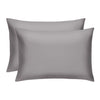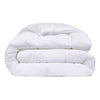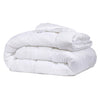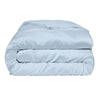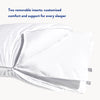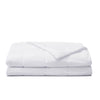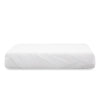The Daily Miracle
What Is Core Sleep Vs Deep Sleep?
Published
July 26, 2025
Author
John Tsenekos

Ever wake up groggy, even after what seemed like a full night’s sleep? For many people, missing out on core sleep is the real reason they don’t feel fully rested. With so much information out there about sleep cycles, it’s easy to get mixed up about what really matters, especially when it comes to terms like core sleep, REM sleep, and deep sleep. Knowing how these sleep stages work and why they matter can make all the difference in how you feel each morning. In this article, you’ll discover what core sleep is, why it’s important, and how it ties in with deep sleep. Plus, you’ll get straightforward tips on how you can use relaxation techniques to improve your sleep and help you wake up feeling refreshed and ready to take on the day. Let’s explore what your body truly needs for a great night’s sleep.
What is Core Sleep?
Core sleep is the essential amount of sleep your body needs to stay healthy, support your emotional health, and function well. It’s the base level of sleep required for physical and mental well-being, including important stages such as REM sleep and NREM sleep, no matter how much sleep you want or think you need. Unlike the total hours of sleep you might aim for, core sleep zeroes in on the absolute minimum sleep necessary to support processes like hormone regulation, immune function, and cognitive recovery. Figuring out your core sleep needs requires understanding your unique circadian rhythm and making sure you consistently prioritize this critical sleep window. If you skimp on core sleep, adding extra time in lighter stages won’t make up for the effects of the shortfall.
What is Deep Sleep?
Deep sleep, often called slow-wave sleep, is one of the most restorative sleep phases. During this stage, your body works hard to repair tissues, build bone and muscle, and strengthen your immune system. It’s when your body truly recovers, helping you feel refreshed the next day. While every sleep stage plays a role, deep sleep and REM sleep both stand out for their impact on physical recovery and energy rejuvenation. The tricky part? Deep sleep tends to decline as you age, and factors like stress or poor sleep routines can reduce it even further. When this happens, your overall health can take a hit.
What is Core Sleep vs Deep Sleep?
Purpose and Function
Core Sleep:
-
Focuses on the minimum sleep required to keep your body running efficiently.
-
Supports pivotal processes like hormone regulation and immune health.
-
Serves as the foundation for overall well-being.
Deep Sleep:
-
Devotes itself to repairing and restoring your body.
-
Includes tasks like tissue rebuilding, immunity boosting, and energy conservation.
-
Represents one vital phase of the sleep cycle.
Brain Wave Activity
Core Sleep:
-
Includes all sleep stages, light, deep, and REM sleep.
-
Doesn’t stick to just one brain wave pattern but involves multiple cycles.
-
Depends on individual needs.
Deep Sleep:
-
Shows up as slow delta brain waves, signaling the deepest form of relaxation.
-
Comes with reduced brain activity, slower heart rate, and calmer breathing.
-
Helps solidify memories and supports memory consolidation, thus aiding in learning.
Measurability
Core Sleep:
-
Assessed through self-monitoring and evaluating sleep patterns over time.
-
Determined by noticing when sleep deprivation hampers focus and cognition.
-
Measured by overall sleep time and how rested you feel.
Deep Sleep:
-
Typically measured via sleep studies (polysomnography) that track brain activity, including REM sleep phases.
-
Quality depends on the percentage of time spent in deep sleep and REM sleep over total sleep.
-
It can also be estimated using wearable sleep trackers.
Impact of Deprivation
Core Sleep:
-
Lack of it leads to emotional, mental, and physical strain.
-
Heightens the risk of chronic diseases, cognitive decline, and mood swings.
-
Disrupts nearly every system in your body over time.
Deep Sleep:
-
Specifically affects your ability to recover, fight infections, and feel energized.
-
Leaves you more prone to illness and less capable of repairing tissues.
-
Can sap your stamina and even impact athletic performance.
How Does Core Sleep Differ From the Stages of Deep Sleep?
Core sleep isn’t tied to a particular stage like deep sleep is. Instead, it’s the total sleep time you need to keep your body and mind at their best. Deep sleep, on the other hand, is one specific and critical part of the overall sleep cycle, including NREM sleep and REM sleep, which are crucial for memory consolidation and emotional processing. Think of core sleep as your all-inclusive sleep “budget,” and deep sleep as an important expenditure. You can meet your core sleep hours without maxing out deep sleep and vice versa, as optional sleep elements can also contribute to overall restfulness. But here’s the catch: both are vital. Deep sleep delivers important recovery perks, and making core sleep a priority ensures there’s enough time for all phases, including deep sleep, to do their job effectively.
What Health Benefits Does Prioritizing Core Sleep Offer?
Making core sleep a priority delivers a whole range of benefits that go far beyond simply feeling rested, including improved cognitive function. Adequate core sleep strengthens your immune system, keeping illnesses at bay. It sharpens your memory, focus, and decision-making, making you more mentally on point. Emotionally, it helps you stay balanced, taking the edge off irritability and even reducing the risk of mood disorders. On a physical level, it stabilizes stress hormones like cortisol and promotes the release of growth hormones for muscle repair and overall health.
How Accurate Is Apple Watch Sleep Analysis?
Apple Watch sleep analysis offers a convenient way to track your sleep patterns, but it’s important to understand its strengths and limitations. The Apple Watch uses motion sensors, heart rate monitoring, and smart algorithms to estimate when you’re asleep and which stage of sleep, including REM sleep, you’re in. While it provides a helpful overview of your sleep habits, like total sleep time and consistency, it’s not as precise as a medical sleep study, which can diagnose conditions like sleep apnea.
For most users, the Apple Watch does a good job of identifying general trends, such as how often you wake up during the night or how much time you spend in bed. However, it may not always accurately separate light, deep, and REM sleep, since it doesn’t measure brain activity like professional sleep tests. Tracking your sleep with an Apple Watch can still be a valuable way to notice patterns and make improvements to your routine. If you’re looking for an easy way to stay mindful of your sleep habits, it’s a useful tool. But if you have ongoing sleep issues, it’s always a good idea to consult a healthcare professional.
Common Misconceptions About Core Sleep and Deep Sleep
Absolutely! One big myth is that everyone needs eight hours of sleep. The truth? Core sleep requirements are highly individual. Some people do great on seven hours of sleep, while others feel best with nine, and for some, optional sleep might further help achieve the perfect balance. Another misconception is that “more deep sleep or REM sleep is always better,” when in fact, overdoing it can sometimes leave you feeling groggy. There’s also the assumption that good sleep quantity can make up for poor quality, but that’s not the case. Achieving both sufficient core sleep and quality deep sleep is key to feeling truly rested and recharged.
How Can I Determine If I’m Getting Enough Or Too Much Core Sleep?
Figuring out whether you’re meeting your core sleep needs doesn’t have to be complicated. Start by paying attention to how you feel throughout the day. Are you constantly tired? Struggling to focus? Relying on copious amounts of caffeine? These are subtle signs of sleep debt or oversleeping. Try going to bed 15–30 minutes earlier each night and see how it affects your energy and focus the next day. On the flip side, try waking up earlier to see if your energy levels are better with less sleep. When you consistently wake up feeling refreshed, without needing an alarm, you’ve likely nailed your core sleep sweet spot. Keeping a sleep diary can also help you track patterns and pinpoint what’s working.
What Factors Can Disrupt Both Core Sleep and Deep Sleep?
A lot of factors can interfere with both core and deep sleep, making it tough to get the rest your body needs. Here are some common culprits to watch out for:
-
Stress and anxiety: These can activate your nervous system, making it harder to fall asleep or stay asleep.
-
Poor sleep habits: Staying up late with your phone, irregular bedtimes, or skipping a calming bedtime routine can disrupt your sleep cycles.
-
Health conditions: Issues like sleep apnea, other sleep disorders, or chronic pain can interrupt your rest.
-
Caffeine and alcohol: Consuming too much of either, especially later in the day, can throw off your sleep quality.
How Do Core Sleep and Deep Sleep Contribute to Overall Sleep Quality?
Core sleep, deep sleep, and sleep duration are a team effort when it comes to great sleep quality. Core sleep ensures you’re getting the time needed for all the essential stages of sleep, including REM sleep, to occur. Deep sleep, in particular, amps up the restorative benefits of that time, helping you recharge both physically and mentally, which is crucial for maintaining good mental health. When you optimize both, you’ll experience sharper thinking, better emotional regulation, and improved immunity. But neglecting either can leave you feeling off-balance, no matter how long you stay in bed. It’s all about finding the right balance of quantity and quality.
How to Optimize Your Sleep Schedule for Both Core and Deep Sleep
-
Maintain a Consistent Sleep Schedule: Go to bed and wake up at the same time daily, even on weekends, to keep your sleep-wake cycle in sync. This routine supports deeper, more restorative sleep.
-
Create a Relaxing Bedtime Routine: Unwind with calming activities like gentle reading, a warm bath, or meditation. Skip stimulating tasks, like scrolling on your phone, before bed.
-
Optimize Your Sleep Environment: Make your room dark, quiet, and comfortably cool. Blackout curtains, earplugs, and white noise machines can help create the perfect sleep haven.
-
Limit Exposure to Blue Light: Turn off screens at least an hour before bedtime. Blue light from devices can interfere with melatonin production, a hormone essential for sleep.
-
Consider Regular Exercise: Regular physical activity can improve your sleep, but try to avoid intense workouts right before bed. Finish exercising at least three hours in advance.
Conclusion
The key to great sleep lies in balancing core sleep, deep sleep, and REM sleep. Simple changes, like minimizing blue light exposure or creating a calming bedtime ritual, can make a huge difference. Embrace these habits, and you’ll wake up ready to take on the day.
Want to boost your sleep quality? The right bed sheets can make a big difference in how well you rest. Explore the Miracle Made Sheet Set that is breathable, comfortable, and designed to help you create the ideal sleep environment. Treat yourself to bedding that supports better sleep and start waking up refreshed every morning.
Sources:


